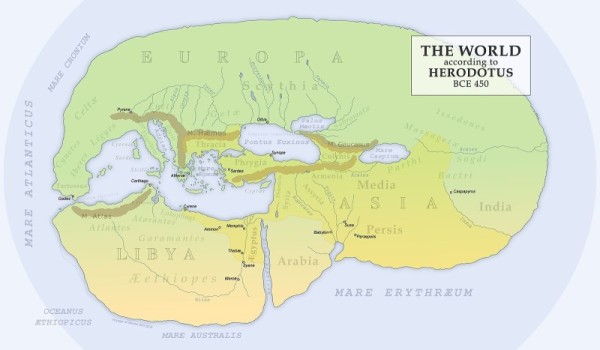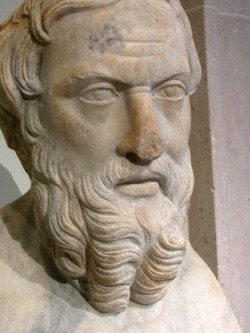I was witness moreover of a great marvel, being informed of it by the natives of the place; for of the bones scattered about of those who fell in this fight, each side separately . . . .

Translated by George C. Macaulay — our special project presenting the complete Herodotus with URLs for all of those people, places, events, and things which baffles and discourages modern readers.
Previously on Herodotus
11. Now when the Persians had marched quite through the waterless region and were encamped near the Egyptians with design to engage battle, then the foreign mercenaries of the Egyptian king, who were Hellenes and Carians, having a quarrel with Phanes because he had brought against Egypt an army of foreign speech, contrived against him as follows: — Phanes had children whom he had left behind in Egypt: these they brought to their camp and into the sight of their father, and they set up a mixing-bowl between the two camps, and after that they brought up the children one by one and cut their throats so that the blood ran into the bowl. Then when they had gone through the whole number of the children, they brought and poured into the bowl both wine and water, and not until the mercenaries had all drunk of the blood, did they engage battle. Then after a battle had been fought with great stubbornness, and very many had fallen of both the armies, the Egyptians at length turned to flight.
12. I was witness moreover of a great marvel, being informed of it by the natives of the place; for of the bones scattered about of those who fell in this fight, each side separately, since the bones of the Persians were lying apart on one side according as they were divided at first, and those of the Egyptians on the other, the skulls of the Persians are so weak that if you shall hit them only with a pebble you will make a hole in them, while those of the Egyptians are so exceedingly strong that you would hardly break them if you struck them with a large stone. The cause of it, they say, was this, and I for my part readily believe them, namely that the Egyptians beginning from their early childhood shave their heads, and the bone is thickened by exposure to the sun: and this is also the cause of their not becoming bald-headed; for among the Egyptians you see fewer bald-headed men than among any other race. This then is the reason why these have their skulls strong; and the reason why the Persians have theirs weak is that they keep them delicately in the shade from the first by wearing “tiaras”, that is felt caps. So far of this: and I saw also a similar thing to this at Papremis, in the case of those who were slain together with Achaimenes the son of Darius, by Inaros the Libyan.

CC BY-SA 2.0 image from Wikipedia.
13. The Egyptians when they turned to flight from the battle fled in disorder: and they being shut up in Memphis, Cambyses sent a ship of Mytilene up the river bearing a Persian herald, to summon the Egyptians to make terms of surrender; but they, when they saw the ship had entered into Memphis, pouring forth in a body from the fortress both destroyed the ship and also tore the men in it limb from limb, and so bore them into the fortress. After this the Egyptians being besieged, in course of time surrendered themselves; and the Libyans who dwell on the borders of Egypt, being struck with terror by that which had happened to Egypt, delivered themselves up without resistance, and they both laid on themselves a tribute and sent presents: likewise also those of Kyrene and Barca, being struck with terror equally with the Libyans, acted in a similar manner: and Cambyses accepted graciously the gifts which came from the Libyans, but as for those which came from the men of Kyrene, finding fault with them, as I suppose, because they were too small in amount (for the Kyrenians sent in fact five hundred pounds’ weight of silver), he took the silver by handfuls and scattered it with his own hand among his soldiers.
– Herodotus, Book III
| <—Previous | Master List | Next—> |
Herodotus made his living by being interesting. In a world where most people did not read and could not afford to buy a book even if they could, they would pay to listen to Herodotus recite from his books. They would not pay to be bored. In that world, the names that populate his stories would have some general familiarity to his audience. Their obscurity to us is a barrier that this series seeks to break down.
MORE INFORMATION
MAP LIBRARY
Because of lack of detail in maps as embedded images, we are providing links instead, enabling readers to view them full screen.
